|
|
|
Sort Order |
|
|
|
Items / Page
|
|
|
|
|
|
|
| Srl | Item |
| 1 |
ID:
181327


|
|
|
|
|
| Summary/Abstract |
When Israel occupied the West Bank and the Gaza Strip in 1967, restrictions on Palestinian movement were gradually put in place. Today an intricate ‘architecture of occupation’ has been established – made up of numerous material barriers, the continuous expansion of illegal Israeli settlements on the West Bank, and the establishment of an elaborate checkpoint system. For most inhabitants of the West Bank, passing through an Israeli checkpoint is a daily ritual they cannot avoid. In this article, I analyse two car checkpoints in the Bethlehem area: The Tunnels and Al Walaja, and the experiences of the Palestinian and Jewish Israeli commuters subjected to them. I argue that these checkpoints are spaces where two different, but inherently connected, mobility regimes meet: providing Jewish settlers swift and seamless passage, while controlling and hindering Palestinian commuters. I indicate how the existence of these two mobility regimes is only possible due to the low-tech design of the checkpoints, as well as the implementation of numerous biopolitical categories by the checkpoints managers. The implementation of these biopolitical categories was experienced by my interviewees as highly arbitrary as it allows the Israeli soldiers to act ‘biopolitically on the spot’, reinstating over and over again the asymmetrical relationship between the occupier and occupied. Moreover, I analyse how Palestinian commuters employ their ‘checkpoint knowledge’ in response to this arbitrariness to try to positively influence their passages: incorporating the rules and regulations as much as possible or trying to manipulate and twist the checkpoints’ practices and biopolitical categories.
|
|
|
|
|
|
|
|
|
|
|
|
|
|
|
|
| 2 |
ID:
112773
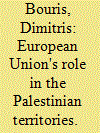

|
|
|
|
|
| Publication |
2012.
|
| Summary/Abstract |
The aim of this article is to shed light on the distinctive role of the EU in Security Sector Reform (SSR) in the case of the Occupied Palestinian Territories (OPTs) and examine how SSR has contributed to the overall state-building project. Following the Oslo Accords, the EU engaged actively in the state-building project in the OPTs taking a number of initiatives on the ground. Since then security has been a key issue in all Israeli-Palestinian agreements and has also became synonymous with Palestinian statehood. The article draws upon literature on state-building and SSR and its central aim is to examine the distinctive initiatives that the EU has taken in order to help the Palestinian Authority (PA) reform both its security and judiciary sector as part of its broader state-building strategy towards the OPTs, as well as provide explanations on why these policies had limited impact.
|
|
|
|
|
|
|
|
|
|
|
|
|
|
|
|
| 3 |
ID:
189544
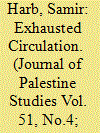

|
|
|
|
|
| Summary/Abstract |
This article looks at cement as a vital material in the process of urbanization. It specifically addresses urban metabolism, examining the intricacies of the cement circulation network in the occupied Palestinian territories (oPt) during the post-Oslo period. Because of Israel’s near-total control of land and natural resources in the oPt, there is still no fully integrated Palestinian cement plant there, making the Palestinian construction sector highly dependent on imports from Israel’s Nesher cement factory. This article argues that controlling the circulation of cement constitutes sovereignty over the processes of urbanization. In the current context, the cement circulation system that is effectively controlled by Israel is characterized by exhaustion, resulting in Palestinian urban geography’s perennial metabolic insufficiency.
|
|
|
|
|
|
|
|
|
|
|
|
|
|
|
|
| 4 |
ID:
184486
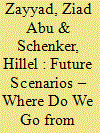

|
|
|
|
|
| Summary/Abstract |
These are difficult days, both with the war in Europe upsetting the whole international order and tense times in Israel-Palestine. There has been a rise in the number of Palestinians killed by the Israel Police and Border Police, some of them after they were wounded and lay on the ground. In most of the cases, the official Israeli announcement claimed that they were “neutralized” after stabbing attempts. Seven Palestinians were killed in February and 18 in March, including children, one of whom was only 14 years old, and two 80-year-old. On the Israeli side, 11 people were killed in late March in three armed attacks on civilian targets within one week — two of them by Palestinian Israelis associated with the Islamic State (ISIS) and one by a Palestinian from Ya’bad in the Jenin district — and three more civilians were killed 10 days later on Dizengoff Street in the heart of Tel Aviv.
|
|
|
|
|
|
|
|
|
|
|
|
|
|
|
|
| 5 |
ID:
172366
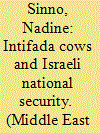

|
|
|
|
|
| Summary/Abstract |
The Wanted 18 narrates the story of a Palestinian town whose residents assert their autonomy by purchasing 18 cows and producing their own milk during the first intifada. In response, the Israeli military declares the cows a ‘threat to the security of Israel’ and hunts down the ‘wanted 18.’ This article provides an analysis of The Wanted 18, focusing on the human-animal interactions. It demonstrates how film directors Amer Shomali and Paul Cowan deploy animal protagonists as a means of exposing anti-Palestinian prejudice, critiquing Israeli occupation and the Palestinian authorities who undermined civil resistance during the first intifada, and elucidating the transformative impact of human-animal companionship and creative resistance in a humorous manner that appeals to a global audience.
|
|
|
|
|
|
|
|
|
|
|
|
|
|
|
|
| 6 |
ID:
142442


|
|
|
|
|
| Summary/Abstract |
Whether Palestinians protest violently or nonviolently Israel responds with military force, so how can the violence end in the Occupied Palestinian Territories without an end to occupation?
|
|
|
|
|
|
|
|
|
|
|
|
|
|
|
|
| 7 |
ID:
124611


|
|
|
|
|
| Publication |
2013.
|
| Summary/Abstract |
This article explains the current political role of the Palestinian youth by comparing the period shortly before the First and Second Intifadas with the current situation in the Occupied Palestinian Territories (OPT). It critically interrogates the oft-repeated assertion that the Palestinian youth are characterized by political anomie, showing that the political role of the youth in the OPT is constrained by three factors: Israeli occupation, oppression by Fatah and Hamas, and the political paralysis resulting from the split between these two dominant political organizations. However, the present youth activism challenges the policies of both Fatah and Hamas, and draws strength from its utilization of international cooperation and its popular practices. While it is still small, this youthful activism displays a determination, clearheadedness and independence that contrast with the political culture in the dominant factions of Palestinian politics.
|
|
|
|
|
|
|
|
|
|
|
|
|
|
|
|
| 8 |
ID:
151085


|
|
|
|
|
| Summary/Abstract |
It is important to frame the situation in Israel-Palestine in the context of colonialism for the application of the human rights and a full understanding of the dual legal system in the West Bank.
|
|
|
|
|
|
|
|
|
|
|
|
|
|
|
|
| 9 |
ID:
169453


|
|
|
|
|
| Summary/Abstract |
After Tony Blair resigned as the United Kingdom’s prime minister in June 2007, he was appointed as the official envoy of the Quartet on the Middle East. His appointment was marred with controversy not the least with regard to his suitability for the role and his performance as peace envoy, with many observers questioning his ethical credentials. The EU along with the US, Russia and the UN make up the Quartet and funded Blair’s office until 2012. With the US and the EU as the key regional players in this conflict, Blair became an embodiment of these players in this specific role. This article employs critical discourse analysis to nuance whether Tony Blair’s role as Middle East envoy, and as an embodiment of the EU, was indeed a legitimate one in terms of achieving at least some of its stated aims, particularly those pertaining to the Palestinians who live under Israel’s colonization. It does so by engaging with the work of John Street and more broadly the literature on celebrity politicians and by counterbalancing this conceptual framework with a critical reflection on Blair’s time as Middle East envoy.
|
|
|
|
|
|
|
|
|
|
|
|
|
|
|
|
| 10 |
ID:
161100
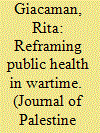

|
|
|
|
|
| Summary/Abstract |
This article traces the research trajectory of the Institute of Community and Public Health (ICPH) at Birzeit University, whose work focuses on life and health outcomes for Palestinians living in chronic warlike conditions under Israeli settler-colonial rule. Over decades of field-based work, ICPH researchers came to the realization that medicalized responses to trauma contributed to concealing the social and political meaning that Palestinians attribute to their collective experience. By adopting an approach that linked the biological/biomedical sphere to the political sphere through the concept of suffering, and exposing the sociopolitical conditions of life and the collective trauma inducing nature of Israeli military occupation and repression, ICPH's research has allowed for the simultaneous personalization of war and politicization of health. In addition to discussing some of the health problems identified by ongoing investigations, the article also touches on the ways in which institution building and research production are linked to the capacity of Palestinians to endure and resist violation in their struggle for justice.
|
|
|
|
|
|
|
|
|
|
|
|
|
|
|
|
| 11 |
ID:
116665


|
|
|
|
|
|
|
|